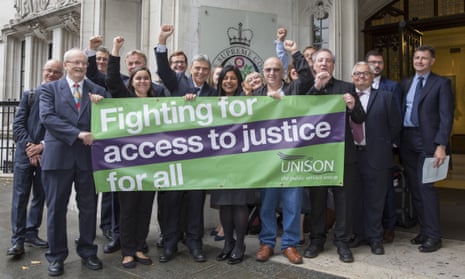The government has been forced into a humiliating overhaul of employment tribunal fees after the supreme court ruled they were inconsistent with access to justice.
The highest UK court came down in favour of the trade union Unison, which argued that fees of up to £1,200 were preventing workers – especially those on lower incomes – from getting justice.
The decision by a panel of seven justices, headed by the court’s president, Lord Neuberger, came after the union lost in the high court and court of appeal. The action was brought against the then lord chancellor and justice secretary, Liz Truss.
The Ministry of Justice said it would take “immediate steps to stop charging fees in employment tribunals and put in place arrangements to refund those who have paid”. Unison said more than £27m of fees needed to be refunded.
The supreme court said it based its conclusion on the fact that fees were “inconsistent with access to justice” and had resulted in a substantial fall in the number of claims being brought.
It said the fees were also contrary to the Equality Act 2010 as they disproportionately affected women.
Unison’s general secretary, Dave Prentis, said it was a major victory for employees. “Unscrupulous employers no longer have the upper hand,” he said.
The trade union said the government would have to refund more than £27m to the thousands of people charged for taking claims to tribunal since July 2013, when fees were introduced by Chris Grayling, the lord chancellor at the time.
The Liberal Democrat deputy leader, Jo Swinson, who was minister for employment relations when the coalition introduced the fees, said the party had become increasingly concerned about the effects on access to justice and admitted they had been unfair.
“The Conservatives repeatedly blocked my requests for action to redress this in coalition, and then stuck their heads in the sand when official research on pregnancy discrimination showed how much tribunal fees are a problem,” she said.
“The evidence has been mounting for years that employees, including many women facing discrimination at work, have been denied access to justice because of these exorbitant fees.”
The Lib Dem leader, Vince Cable, has previously said Conservative ministers including Grayling repeatedly blocked Lib Dem requests for a review of the fees after cases plummeted in the first year, including a 90% fall in the number of sex discrimination cases.
Cable backed the fees when they were introduced in 2013, saying they would make Britain more “enterprise-friendly”, and said changes would “help ensure that people who work hard and do the right thing are rewarded”.
The shadow justice secretary, Richard Burgon, said the government should “consign their immoral employment tribunal fees to the dustbin of history”.
“The Conservative government – which in coalition with the Lib Dems brought in this immoral restricted access to justice – must now pay a £32m price for attacking workers,” he said.
Prentis said: “The government is not above the law, but when ministers introduced fees they were disregarding laws many centuries old, and showing little concern for employees seeking justice following illegal treatment at work.”
The TUC general secretary, Frances O’Grady, said: “This is a massive win for working people. Too many low-paid workers couldn’t afford to uphold their rights at work, even when they have faced harassment or have been sacked unfairly.
“Tribunal fees have been a bonanza for bad bosses, giving them free rein to mistreat staff. Any fees paid so far should be refunded as soon as possible.”
Prof Nicole Busby, the acting head of the law school at the University of Strathclyde, said it was “a very good day for access to justice”.
Business leaders expressed concern about the court ruling. Seamus Nevin, head of employment and Skills Policy at the Institute of Directors, said the judgement “opens the door to a spike in malicious or vexatious claims”.
He said: “Since fees were introduced, the government has imposed crude and potentially misleading gender pay reporting requirements, and an immigration skills charge that incentivises recruitment based on place of birth. Both of these could lead to an increase in unjustified claims.”
Mike Spicer, director of Research at the British Chambers of Commerce, said the ruling would leave “employers concerned about a return to the past, when despite winning the majority of cases, companies would often settle to avoid a costly and protracted process even when their case was strong”.
Employment tribunal fees were introduced by the coalition government in July 2013. Charges started at £160 for issuing a claim for lost wages or breach of contract and increased if the case was heard in a tribunal.
More serious claims, including unfair dismissal, came with a fee of £250 plus a hearing fee of £950. This meant total charges came to £1,200, with appeals against decisions costing a further combined sum of £1,600.
A government report found there had been a 70% drop in the number of cases since 2013. Busby said: “If you look at statistics on the fall in claims being brought … there was a significant reduction in areas such as pregnancy discrimination. I am sure those individuals have been prevented from bringing claims.”
Citizens Advice said it had helped people with almost 350,000 employment issues in the last year. It said it had helped people with 72,500 issues concerning pay and entitlements and dealt with 17,500 inquiries about employment tribunals and appeals.
Gillian Guy, the chief executive of Citizens Advice, said: “Employment tribunal fees have been a huge barrier to justice, but they are not the only challenge people face. What your rights are, and how to go about getting redress without resorting to an employment tribunal remains a very complicated picture, which is why we’re calling on the government to create a single fair work authority to make it easier for people to get the rights they’re entitled to by clamping down on unlawful business practice.”
Shoaib Khan, a human rights lawyer, said: “The government has wasted precious public funds on implementing this unlawful, discriminatory regime, and all fees it has received will have to be reimbursed, at further public cost. A large amount will also have been spent defending this case all the way to the supreme court. If this cruel scheme was meant to be an additional source of revenue for the government, then it has proved to be counterproductive in every way.”
Tim Forer, a partner in the employment law team at the national law firm Blake Morgan, said estimates of how much the government owed ranged from £27m to £31m. He said the practicalities of how the government planned to reimburse people “remain to be seen, and it is not clear how much it will cost”.











Comments (…)
Sign in or create your Guardian account to join the discussion